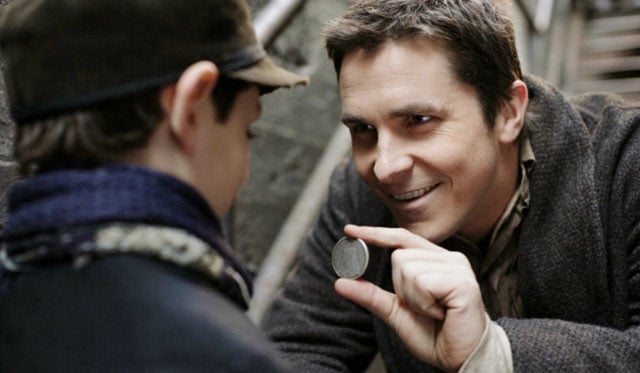
We're counting down to the release of Tenet by looking back at Christopher Nolan's movies in order.
The director's latest project is a typically secretive affair, dealing in armageddon, time inversion and much more besides. John David Washington and Robert Pattinson lead an all-star cast including Kenneth Branagh and Michael Caine.
This week, we're examining Nolan's fifth feature film: The Prestige.
WARNING: SPOILERS AHEAD
What is the story of The Prestige?
In 19th century London, two magicians are in pursuit of the perfect magic trick. Upper-class Angier (Hugh Jackman) is a fine showman but a poor technician, while lower-class Borden (Christian Bale) is the inverse: technically accomplished but poor at selling the illusion. Initially friends, the two become bitter enemies after the tragic drowning of Angier's wife Julia (Piper Perabo) during an on-stage trick.
The wedge grows even deeper when the two men begin to one-up themselves in pursuit of the ultimate 'prestige': the third-act reveal of a magic trick that leaves audiences stunned. With Borden's diary in his possession, Angier travels around the world to meet famed scientist Nikola Tesla (David Bowie), who has developed a machine with extraordinary abilities.
As both men present their own iterations of a trick known as the 'Transported Man', the notion of who is deceiving who becomes muddied. With props developer Cutter (Michael Caine), glamorous assistant Olivia (Scarlett Johansson) and Borden's wife Sarah (Rebecca Hall) becoming embroiled in the mix, the notion of the prestige becomes ever more shocking and terrifying.
How was The Prestige made?
"Are you watching closely?" With those four words, Christopher Nolan's period thriller The Prestige exerts an arresting spell. There are few things more alluring to film audiences than the promise of a great mystery, and The Prestige takes dark-hued delight in leading the audiences down the rabbit hole. The movie brilliantly assimilates the feel of the greatest magic trick: we know we're being bamboozled by a performer who's 10 steps ahead of us (Nolan in this case), but such is our desire to keep up and anticipate the outcome that we remain riveted throughout.
Adapted from Christopher Priest's 1995 book of the same name, The Prestige saw Nolan return to comparatively smaller, more intimate material following 2005's Batman Begins. That movie triumphantly resurrected the Dark Knight for the post-9/11 generation, investing the material with unprecedented darkness and psychological impulses. Of course, Batman Begins took its atmospheric cue from Nolan's critically acclaimed early features Insomnia (2002), and Memento (2000), variously linear and non-linear thrillers dealing with the onset of madness and self-deception.
It's therefore little surprise that every frame of The Prestige radiates Nolan's signature style. It may be set in Victorian-era London, but the movie isn't really interested in the fog-bound, penny dreadful cliches that occupy many movies set during this period. Instead, it applies a surprisingly modernistic, forensic examination of its two central characters, Angier and Borden, whose intense rivalry transcends the period to echo many of mankind's greatest psychological battles. The Prestige, then, is a period thriller with a contemporary sensibility, with main players Hugh Jackman and Christian Bale foregoing grandstanding theatrics in favour of grounded, relatable emotion. Interestingly, the movie was not shot on location in London but on Los Angeles sound stages, which may account for the film's intriguingly claustrophobic air, in which characters are hemmed in and at the mercy of their own relentless myopia.
Not only does the movie encapsulate the emotional thrill of magic, it also assimilates the structure of such tricks as well. This is the pivotal area of the movie, beginning with opening narration from Michael Caine's Cutter. He outlines the three tenets of a magic trick: the pledge (an introduction of an object or person), the turn (the ordinary object does something extraordinary) and the prestige (the apparently impossible final reveal that leaves audiences delighted). In depicting the ongoing battle between Angier and Borden, Nolan cleverly embeds this structure: we are introduced to the characters, they proceed to outdo one another in remarkable (and often shocking) ways and, ultimately, both their lives culminate in jaw-dropping reveals that leave us questioning what we've watched.
For that reason, The Prestige may well be the most meta of all Nolan's movies. Upon repeat viewings, one can better appreciate Nolan's foreshadowing of the final reveal, particularly the opening shot of birds in cages. This anticipates the dreadful endgame where, it transpires, Angier has made use of a machine designed by Nikola Tesla (David Bowie in a suitably enigmatic performance). Every night, Angier (in reality, the aristocratic Lord Caldlow) has been using the machine to replicate himself, dumping a double in a tank below the stage to drown. Meanwhile, the other version of him emerges near the audience to thunderous applause as part of the prestige.
The reveal splits opinion down the middle for the way it takes an apparently grounded story into the realm of science-fiction. But that's the point Nolan has been making throughout: we're presented with an impossible solution, yet we think there is more to it. However, the chilling answer is right there in front of us: every night, Angier has been sacrificing half of himself in favour of audience applause. He is matched with the similarly duplicitous Borden, who, it turns out, has a twin brother named Fallon. Although the latter scorns Angier for his alleged lack of sacrifice (he and Fallon shared half of everything, including partners Sarah and Olivia), the appalling nature of Angier's actions is apparent on that final shot of the body floating in the tank.
The essence of sacrifice is another element that has been threaded through the movie. In an early scene, prior to becoming enemies, Angier and Borden witness the act of Chinese magician Chung Ling Soo, an apparently aged man who can, out of nowhere, produce a fishbowl full of water in front of a rapt audience. Borden being the technician spots the illusion immediately: Chung Ling Soo is not an old man but a young one pretending to be old, and has kept up the pretence off-stage for years. It's another portent of what Borden and Angier will go through later in the movie, although their philosophies differ.
Borden cares little for audience attention, instead favouring the technique of his 'Transported Man' illusion that he shares with Fallon. This trick is introduced midway through the movie and cleverly acts as a double-bluff, with the attendant Angier insisting the sleight-of-hand is performed by the same man. Cutter, however, insists Borden must be using a double – in the end, both he and Angier are right, with the two twins acting as halves of the same body.
As for Angier's approach, being the inferior magician, he lives for the acclaim. It's not enough to take his applause hidden beneath the stage, as he does during an earlier variant of the 'Transported Man', stolen from Borden. As he lies dying at the end of the movie, he claims it was all "to see the looks on their faces". Jackman's slippery, nuanced portrayal of a man concealing multiple identities and motivations is well matched by that of Bale, who carries the air of Oliver Twist as re-imagined by Jeremy Irons in Dead Ringers.
Caine's closing words, "You want to be fooled" sum up the philosophy of the movie: although the solution is there in front of us, we want to remain in denial to preserve the alleged mystery of the trick. Nolan's deep-seated understanding of magic mechanics and the emotions that drive them help assert The Prestige as a masterfully complex and engrossing movie, albeit one that changes many aspects of its source material. Christopher Priest's original novel leapt between the Victorian and 20th-century eras, exploring how the Borden-Angier rivalry laid waste to subsequent generations. This change, and many others made by Nolan, dismayed the author (more on which below), but the film is demonstrably a product of Nolan's mind.
Like Following, Memento, Insomnia and Batman Begins before it, The Prestige is a story about people lost in a maze of their own obsession. The film explores the de-humanising effect of such obsession, an echo of the earlier Memento in which Guy Pearce's short-term memory sufferer is compelled to keep re-writing his own vengeful crusade. Clad in atmospherically stylish design, courtesy of production designer Nathan Crowley and cinematographer Wally Pfister, The Prestige exerts an iron grip and never lets go.
How was The Prestige received?
By the usual standards of Nolan's movies, The Prestige was a low-grosser, taking a still-respectable $109 million against its $40 million budget. Critics were largely enraptured by Nolan's puzzle-box construction, citing its cleverness and sleight of hand deviousness, even if several reviewers alleged that the movie didn't play fair.
The late, great Roger Ebert described the movie as "atmospheric, obsessive, almost satanic". None of those descriptors would surprise anyone who had seen Nolan's previous movies Memento and Insomnia. However, Ebert added a caveat: "What you will learn in the movie is, I believe, a disappointment -- nothing but a trick about a trick. With a sinking heart, I realized that "The Prestige" had jumped the rails, and that rules we thought were in place no longer applied."
The Hollywood Reporter journalist Kirk Honeycutt was even more critical: "Audiences might enjoy this cinematic sleight of hand, but the key characters are such single-minded, calculating individuals that the real magic would be to find any heart in this tale."
One person who also expressed disappointment with the movie was Christopher Priest himself. On his website, Priest praised many aspects of the movie, among them the "seriousness" of the film's intent and its atmospheric design. However, he was critical of Nolan's change to the ending, among many other things.
Nevertheless, in recent years, The Prestige has found favour with critics and audiences alike. Many now allege the movie to be Nolan's masterpiece, including BBC Radio Five Live reviewer Mark Kermode. In a review for rival magician movie Now You See Me, Kermode praised the "philosphy" and "conundrum" of The Prestige, citing its depiction of Chung-Ling Soo as a riveting depiction of the duality of performance.
Like the greatest magic show, The Prestige has refused to settle in the years since, occupying the mind with its multi-faceted themes. Are you watching closely?
What was the next Christopher Nolan movie?
The Dark Knight was Nolan's next movie, starring Christian Bale as Batman and Heath Ledger as The Joker.
Tenet is scheduled for release on 26th August 2020. What is your favourite Christopher Nolan movie? Let us know @Cineworld.




.jpg)
.png)



